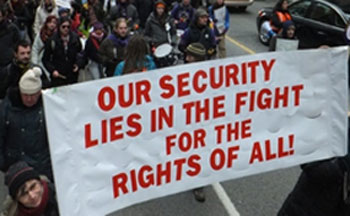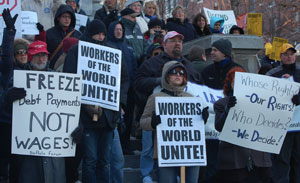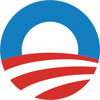Elections 2012
• An Election that Facilitates Plans for a Coalition of Centrists
• Election Reflects Disintegration of Republican and Democratic Parties
Obama Remains Champion of Ruling Class
An Election that Facilitates Plans for
a Coalition of Centrists
 President Barack Obama won re-election November 6, remaining the champion of the ruling circles. In making his victory speech, he began by addressing a main reason why the rich selected him for a second term — he is seen as the one that can preserve the union while keeping the peoples’ resistance under control. In his first sentence Obama said: “Tonight, more than 200 years after a former colony won the right to determine its own destiny, the task of perfecting our union moves forward.” He added, “It moves forward because of you…we are an American family and we rise or fall together as one nation and as one people.”
President Barack Obama won re-election November 6, remaining the champion of the ruling circles. In making his victory speech, he began by addressing a main reason why the rich selected him for a second term — he is seen as the one that can preserve the union while keeping the peoples’ resistance under control. In his first sentence Obama said: “Tonight, more than 200 years after a former colony won the right to determine its own destiny, the task of perfecting our union moves forward.” He added, “It moves forward because of you…we are an American family and we rise or fall together as one nation and as one people.”
He concluded his speech repeating, “I believe we can seize this future together because we are not as divided as our politics suggests. We’re not as cynical as the pundits believe. We are greater than the sum of our individual ambitions, and we remain more than a collection of red states and blue states. We are and forever will be the United States of America.”
Obama here is indicating that the union will “forever” remain, that this can be done if the people join together behind him, as president, and that changes are needed to further “perfect” the union. Elaborating on going “forward,” his main campaign slogan, Obama said, “By itself, the recognition that we have common hopes and dreams won’t end all the gridlock or solve all our problems or substitute for the painstaking work of building consensus and making the difficult compromises needed to move this country forward. But that common bond is where we must begin.”
He continued, “Tonight you voted for action, not politics as usual… I am looking forward to reaching out and working with leaders of both parties to meet the challenges we can only solve together. Reducing our deficit. Reforming our tax code. Fixing our immigration system. Freeing ourselves from foreign oil. We’ve got more work to do.
“But that doesn’t mean your work is done. The role of citizens in our democracy does not end with your vote. America’s never been about what can be done for us. It’s about what can be done by us together…” In giving repeated emphasis that the role of the people is not done, Obama makes clear that his reference to “us together” refers far more to the people supporting Obama to “meet the challenges,” than it does to Obama working with Congress. Indeed, it reflects earlier Obama statements that if necessary, he will “work around Congress.”
Doubts Promoted About Reaching Compromise in Congress
It is also the case that doubt is being raised about whether any compromise can in fact be reached in Congress. Various news reports emphasized that the election can be considered a “status quo” election. They refer to Obama returning as president, Republicans still controlling the House and Democrats still controlling the Senate. As one headline put it: “Verdict on 2012 election — status quo wins.” Said another “Can status quo U.S. government find post-election compromises?” Others emphasized that the country remains divided. Commentators election night spoke of a “civil war” scenario, with Romney taking the south (except Virginia and Florida) and Obama the north. A representative headline said, “Election Day indicates nation’s political divide is deepening.”
 This doubt about compromise coupled with the “divide deepening” was then backed up with various statements from Obama and leading Republicans. Obama says he will veto budget legislation that does not raise taxes on the richest 2 percent (those with incomes of more than $250,000). Obama said, “On Tuesday night, we found out that the majority of Americans agree with my approach – and that includes Democrats, independents and a lot of Republicans across the country, as well as independent economists and budget experts.” He added, “So our job now is to get a majority in Congress to reflect the will of the American people.”
This doubt about compromise coupled with the “divide deepening” was then backed up with various statements from Obama and leading Republicans. Obama says he will veto budget legislation that does not raise taxes on the richest 2 percent (those with incomes of more than $250,000). Obama said, “On Tuesday night, we found out that the majority of Americans agree with my approach – and that includes Democrats, independents and a lot of Republicans across the country, as well as independent economists and budget experts.” He added, “So our job now is to get a majority in Congress to reflect the will of the American people.”
Republican head of the House Speaker John A Boehner says Republicans will not accept any increase in the top income tax rate. He too, though, talks of compromise saying to Obama, “We’re ready to be led — not as Democrats or Republicans, but as Americans. We want you to lead, not as a liberal or a conservative, but as president of the United States of America.” Senator Harry Reid, leader of a Democratic Senate majority that gained a few seats (53, up from 50; up to 55 if two independents are included). While saying that Democrats would not be pushed around, Senator Reid, a former boxer, added, “It’s better to dance than to fight.”
Coalition of Centrists
It will be noted that both Obama and Boehner speak of compromise across party lines. Obama talks of “Democrats, independents and a lot of Republicans,” that agree with him. Boehner refers to “liberals and conservatives.” In this manner both are indicating that previous arrangements, based on party lines, are finished and new alignments are in the works. The continued talk about “red” and “blue” states also indicates the concern among the rulers that the conflicts among them are endangering the union — that the current cold civil war will go hot. The most powerful factions want to avoid this while pursuing U.S. empire building. Obama is their man to accomplish this.
A “status quo” election facilitates a new alignment, that of a coalition of centrists, following Obama, as president and Commander in Chief. Congressional dysfunction and inability to “get a majority in Congress to reflect the will of the American people” will be utilized to justify having the executive take control of the purse strings. A coalition of centrists under the Office of the President that includes “Democrats, independents and a lot of Republicans,” will be utilized to work out a compromise and perhaps form a permanent, or at least long-term “budget committee” to decide the budget. This is the pattern that has been used in New York for Control Boards in Buffalo and in Michigan for the “financial managers.” An appointed body or individual takes control, while the elected legislative bodies remain, but are stripped of budgetary powers.
The development of such a “budget committee” may well occur during the upcoming “lame duck” session of Congress, or in the coming year. Whichever timeframe, what is significant is the move to have the Office of the President take control of the purse strings, likely using a “coalition of centrists,” said to represent the “will of the American people.”
 Obama’s selection as champion of the rich shows that, as we stated November 5, he is seen “able to preserve the union under conditions of the current cold civil war going hot. He is the one who can be successful in putting the public purse strings directly in the hands of the monopoly financiers, keep the people repressed while keeping the union whole. Or at least that is what the rulers hope,” (see: A “Coalition of Centrists” in the Making ).
Obama’s selection as champion of the rich shows that, as we stated November 5, he is seen “able to preserve the union under conditions of the current cold civil war going hot. He is the one who can be successful in putting the public purse strings directly in the hands of the monopoly financiers, keep the people repressed while keeping the union whole. Or at least that is what the rulers hope,” (see: A “Coalition of Centrists” in the Making ).
What is being left out entirely in this discourse is the reality that the working class has a very different vision for the future of the country, that does not involve more payments to the rich and more attacks on social programs. Its stand is to urge all to demand that governments at all levels Stop Paying the Rich, Increase Funding for Social Programs!
[TOP]
Empowerment of the People Needed
Election Reflects Disintegration of
Republican and Democratic Parties
The 2012 election, where both Obama and Romney ran on the basis of their own machinery, not that of the parties, reflects the disintegration of the parties and their electoral machinery.

 Obama ran and won based on machinery he put in place in 2008 and maintained for 2012. It included both a strong internet army and ground forces. In all his massive advertising, he did not use the traditional Democratic symbol of a donkey. Instead he devised his own symbol, representing himself as a candidate. Romney generally did the same.
Obama ran and won based on machinery he put in place in 2008 and maintained for 2012. It included both a strong internet army and ground forces. In all his massive advertising, he did not use the traditional Democratic symbol of a donkey. Instead he devised his own symbol, representing himself as a candidate. Romney generally did the same.
Perhaps more significant, especially for Obama, was the fact that neither ran calling on people to vote for their party. They called on people to vote for them, as individual candidates. Many Democrats in races at the state level, such as those in California for example, complained that Obama did not campaign for them or even promote them. He generally did not make statements, in campaign stops or in advertising, calling on people to vote the Democratic Party ticket. Nor did Romney. Such statements were common and largely required in the past. For 2012, both candidates instead campaigned as individual candidates urging voters to “vote for me,” or saying, “I need your vote.”
In the most expensive election on record, each candidate largely raised their own funds, or utilized outside funds, with party funds playing less of a role. For example, the Republican National Committee, the main source for presidential races, spent about $300 million, while all the non-party super Political Action Committees (Super PACs), only one source of outside money, spent more than $631 million. Most of this went to the Romney campaign, along with individual Republican candidates favored by the various Super PACs. Overall the Democratic Party spent $814 million and the Republican $776 million. Total estimates for the elections overall are $6 billion, with the presidential race accounting for more than $2 billion.
Further, post-election there is talk about the splintering of the parties. Obama talks not of strengthening the Democrats, but of working together with “Democrats, independents and a lot of Republicans across the country” that agree with him. He speaks of “working around Congress” if Democrats and Republicans refuse to reach the “difficult compromises” needed. He is emphasizing, as he did during the campaign, that people need to agree with and follow him, as president. He is not positioning himself as the leader of the Democratic Party, but rather as the individual candidate who won and who everyone must now rally around.
Various factions within the Republican Party also speak of the demise of the party. “Republicans were decimated last night,” said Craig Robinson, former political director of the Iowa Republican Party. “You look at the presidential race and congressional map and you say, ‘My God, this is horrible.’ I tweeted last night that the biggest problem isn’t President Obama. It’s ourselves.”
“Some people are talking about civil war, but I don’t think it will happen in reality,” said Bill Dal Col, a Republican strategist who ran publisher Steve Forbes’ 1996 presidential campaign. He said there will be a coalescing, but others reject such a development.
“What we got was a weak moderate candidate, handpicked by the Beltway elites and country club establishment wing of the Republican Party,” said Jenny Beth Martin, national coordinator for the Tea Party Patriots. “The presidential loss is unequivocally on them.”
Conservative writer and strategist Brent Bozell said, “It is time for conservatives to withhold any further support, financial and otherwise, to the Republican Party unless and until the GOP re-earns our trust.”
 What emerges is that there are “extremists,” in both parties who refuse to compromise and do what is needed. These “liberals” among the Democrats and “conservatives” among the Republicans are blocking the “compromises” being demanded by the financial oligarchy, for more massive cuts to social programs and more guaranteed payments to the rich, in the form of war funding and debt payments. There is not talk about reinvigorating either the Democratic of Republican parties. Instead, as New York City Mayor Bloomberg put it, what is now needed is a “developing and sustaining a coalition of centrists” and building “the trust of moderates,” both sides of the aisle. Bloomberg backed Obama and, together with Bill Clinton, Colin Powell and others, will play a role in achieving such a coalition.
What emerges is that there are “extremists,” in both parties who refuse to compromise and do what is needed. These “liberals” among the Democrats and “conservatives” among the Republicans are blocking the “compromises” being demanded by the financial oligarchy, for more massive cuts to social programs and more guaranteed payments to the rich, in the form of war funding and debt payments. There is not talk about reinvigorating either the Democratic of Republican parties. Instead, as New York City Mayor Bloomberg put it, what is now needed is a “developing and sustaining a coalition of centrists” and building “the trust of moderates,” both sides of the aisle. Bloomberg backed Obama and, together with Bill Clinton, Colin Powell and others, will play a role in achieving such a coalition.
With Obama as their champion, such a “coalition of centrists” is the hope of the ruling class to prevent a bloody civil war, while also keeping the people out of power.
96 Million Did not Vote
While the ruling circles talk of Obama’s win and the need for a new arrangement like a coalition of centrists, the people are also expressing their rejection of the existing set up. It is estimated that 96 million eligible voters did not vote. This is far more than the number secured by either Obama or Romney. Obama secured about 61.7 million votes or about 50.6 percent of the votes cast. Romney got about 58.5 million votes, or 47.9 percent. About 2 percent chose one of the third party candidates. This means of an estimated 216.2 million voters, Obama secured only about 28.5 percent of the popular vote. His election cannot be said to represent the “will of the American people.” Even in 2008, when turnout was the highest in any presidential election since 1960, almost 80 million eligible voters did not vote.
The current electoral set-up excludes the people from power. This is done not only through the massive amounts needed to run, but also through a machinery making it very difficult for a worker politician, representing the anti-war pro-social agenda of workers, to even get on the ballot, let alone get her program widely known among the people. This is especially true for federal level elections. It is a machinery that directly disenfranchises voters, through numerous registration requirements, including identification requirements, and all the regulations concerning when and where to vote and serving to keep votes from being counted.
 The broad lack of participation represented by the 96 million “no votes” is indicative of the necessity for a new electoral set-up that empowers the people to govern and decide. Elections 2012 show clearly the need for Public Financing of the Process, Not the Candidates! An electoral set up that favors worker politicians representing the anti-war, pro-social agenda of the workers is needed. This is a step favoring the interests of the working class.
The broad lack of participation represented by the 96 million “no votes” is indicative of the necessity for a new electoral set-up that empowers the people to govern and decide. Elections 2012 show clearly the need for Public Financing of the Process, Not the Candidates! An electoral set up that favors worker politicians representing the anti-war, pro-social agenda of the workers is needed. This is a step favoring the interests of the working class.
As the two parties of the rich disintegrate and different alignments of the rich emerge, the rulers are calling on the people to support them and abandon their own independent path. Instead, let all concerned join in developing the independent politics and independent organizations of the working class. These include renewed unions, people’s defense committees and local empowerment councils, all fighting for the rights of all. It also requires answering the question, What Kind of Party? for the working class. The USMLO puts forward the call for a single, united Marxist-Leninist party of the U.S. working class to lead the way.
[TOP]
